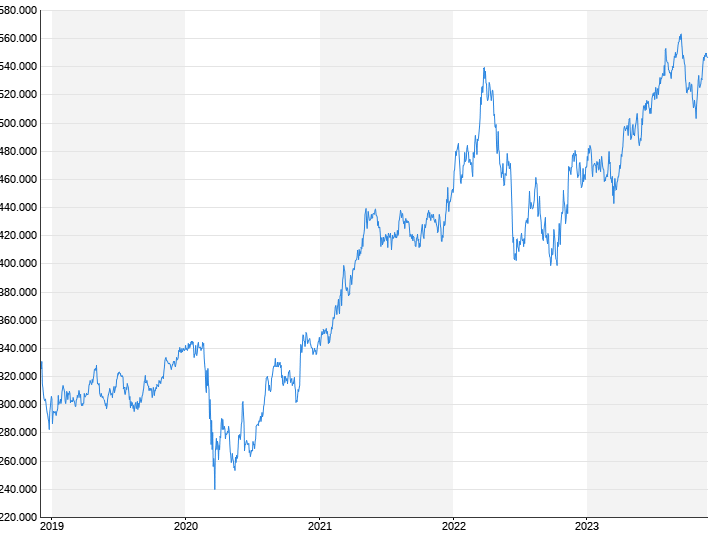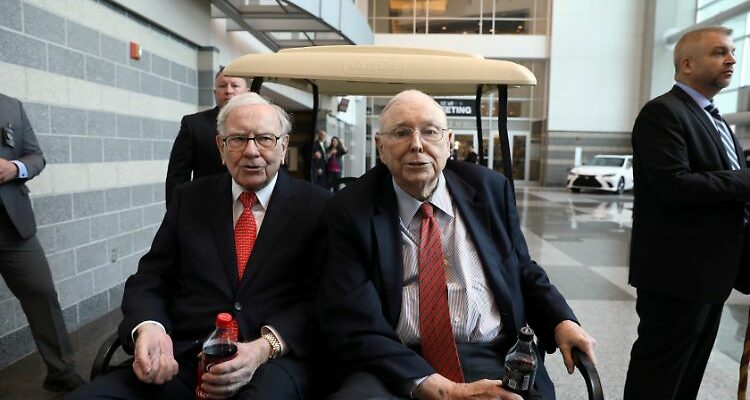Warren Buffet is the public face of Berkshire Hathaway. But without his right-hand man, Charles Munger, the success of the investment company would never have been possible. The power investor with a different relationship to money died at the age of 99.
The global investment community is one poorer. “Charlie” Munger, the visionary vice president of the investment company Berkshire Hathaway and Warren Buffett’s closest companion, has died in a hospital in California at the age of 99.
Munger was formally “only” the second man at Berkshire, but he was never in Buffett’s shadow. Which was also because Munger was much more than just his “alter ego,” as he was often called. Both men complemented each other perfectly – but were still fundamentally different. Munger was always more cosmopolitan and had better social antennae, says admirer Hendrik Leber from the asset management company Acatis ntv.de. Even though Munger was never an enthusiastic media man like Buffett, he had his fan base.
One of his great strengths was his ability to withdraw; he didn’t always have to hear himself talk. Provided the mindsets were aligned, he got along with business partners in just a few words – including Buffett, who once said they could go through a four-page memo together over the phone with three grunts. It became a running joke that Munger said at the general meetings after Buffett’s remarks: “I have nothing more to add.” Tren Griffin chose the quote as the title for his Munger biography in 2018, and stock expert Leber contributed the foreword.
“A living book on legs”
Munger deeply captivated listeners with his profound life experience and his extraordinarily broad knowledge, Leber remembers. “When a question was asked of him, sometimes nothing came for a long time. But what followed was a speech ready for publication.” Munger’s broad American accent and sometimes a heartier choice of words were the special touch.
Munger was well-read and remained thirsty for knowledge throughout his life. “You would be amazed at how much Warren Buffett reads – and how much I read too. My children think it’s funny. They think I’m a living book on legs,” he once said of himself. He also provided the explanation: “Throughout my life I have not met a wise person who did not read consistently.”
He had respect for engineers and scientists, but was also interested in economics, psychology and philosophy. “If you only have a hammer, every problem looks more or less like a nail,” he once summarized it. He had little use for expert idiots. The approach became the formula for his business success.
Two men from Omaha: first encounter with Warren Buffett


His path into the investment world was not predetermined. Munger, who was born in Omaha in 1924 and was seven years older than Buffett, came from a family of lawyers. He studied mathematics for a short time, joined the army and switched to meteorology, until – in keeping with family tradition – he received his law degree from the renowned Harvard University.
Munger came into contact with the Buffett family at a young age when he worked in the grocery store “Buffett & Son”, which belonged to Warren Buffett’s grandfather. Warren Buffett and Charlie Munger only met for the first time in 1959 in a restaurant in their hometown of Omaha.
At first they had only a loose business connection. However, the meeting left its mark in that it led to Munger entering the investment business following Buffett’s example. In 1962, Munger founded Wesco Financial, a mini version of Berkshire Hathaway. At the time he was still doing two things, running a successful law firm at the same time. He only resigned from his practice as a lawyer in 1965.
The common path for Munger and Buffett began in 1978, when Buffett, under pressure from the US financial regulator SEC, merged his investment activities into Berkshire Hathaway and Munger became vice chairman. A decision that founded an exceptional partnership that would dominate the world of finance for more than four decades. Until the end, the two men are said to have exchanged ideas almost every day, despite their advanced age.
Munger deserves the credit for convincing Buffett of his investment strategy – not the other way around. In his early years, Buffett focused solely on “cigar butt investments,” i.e. undervalued stocks. Quality and growth prospects were secondary to him. Munger, on the other hand, was interested in companies with high quality and looked for competitive advantages. The symbiosis of both approaches is what makes Berkshire successful.
Munger: Quality has its price
A “chocolate deal” is considered a key moment in their shared biography. Berkshire’s investment in the US candy manufacturer “See’s Candies” was a “Saul and Paul moment,” said Leber. Until then, Buffett had been a cheap man. But Munger then convinced him that quality had its price. In the end, Buffett was willing to pay $25 million for the purchase. Since the purchase, the investment has generated billions in profits.
Despite all his acumen, Munger’s instinct for new trends is legendary. As early as 2008, for example, he recognized the potential of e-mobility. “He was deeply convinced that incredible things can happen when two or three things come together,” says Leber.
Munger’s personal life wasn’t always easy. His first marriage ended in divorce, and his second wife, whom he married in 1956, died in 2010. The eldest son of seven died young of leukemia. Due to medical malpractice, Munger lost an eye and was then unable to see. Munger nevertheless maintained strict discipline in every situation and kept the flag high, said Leber.
Munger leaves behind wisdom and insights that resonate. This also includes his words about envy and greed. For Munger, it was envy that drove the world, not greed. He once said in an interview that he couldn’t understand why people couldn’t be happier with what they have.
“I don’t envy anyone”
Munger was frugal throughout his life and never flaunted his wealth, but he still had no problem spending money. He emphasized several times that he had “conquered envy in his own life.” “I don’t care what anyone else has.” For him, creating wealth was a means to an end. He wanted to be free and independent – both in business and private life. It was clear to him that the majority of investors did not share his attitude towards money and assets.
At the end of his life, the power investor, lawyer, manager and patron Munger “only” had an estimated fortune of $2.6 billion. Buffett’s, on the other hand, amounts to almost $120 billion, according to Forbes. He readily admits that he owes a lot to Munger and that he would be much poorer without Munger. Munger certainly still had more than enough to keep him from wanting for anything.

